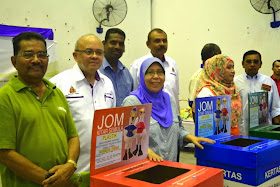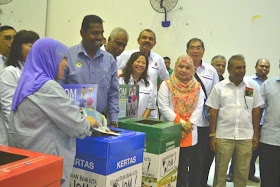The revamped and rebranded Ipoh City Watch (ICW) was officially launched by Dato’ Hj Samsudin Abu Hassan, Executive Councillor for Consumer Affairs, Human Resources, Civil Society and Non-Governmental Organisations on Friday, January 23.
Its president, Associate Professor Dr Richard Ng said with the new committee members, ICW would be the voice of Ipohites in raising issues that affect their city.
“It’s a tall order but our vision is to make Ipoh the most liveable city in Malaysia. We’ll help protect the rights of ratepayers to have a clean, safe and healthy environment. We’ll stand up for the rights to be provided with all amenities as stipulated in the by-laws of the Local Government Act 1976,” he told Ipoh Echo.
Richard Ng took over as the new ICW president for the period of 2015-2016 when he was elected during the EGM held last November. The mandate given comes with a huge responsibility. The committee members will continue with what was set out by the founding members of ICW in November 2002. The only difference is the approach used and the higher expectations of the people.
“We’ll use the three E’s approach – Engage, Explain, Educate. That’s to meet and talk to the people, explain to them what’s right and what’s wrong and to create awareness on doing their part to keep Ipoh clean and safe. Our target is to conduct our walkabout at all 22 zones in the city,” said Richard.
“We want our representatives from all of the city’s 22 zones to highlight issues plaguing their areas, true to the slogan, ‘Our City, Our Responsibility’. We can then bring these up to the relevant authorities for action,” he stressed.
“Most importantly, we want to build bridges with the Ipoh City Council. It is a challenge, as we are often perceived as an Opposition group.”
According to the academician, the biggest challenge for ICW would be to educate the people. “They always think that the cleanliness and the safety of the city are the responsibility of the local and state governments. If everyone had played their roles, Ipoh would be so much cleaner. Engaging the city councillors is another challenge since many are not willing to work with us,” he lamented.
“Non-governmental organisations are going to be the third force that can enhance their responsibility. They should start engaging with us rather than consider us as troublemakers.”
Between November 2014 and March this year, ICW has held six gotong-royong, anti-dengue campaigns and walkabouts to raise awareness on cleanliness. “We’ve visited Jelapang, Buntong, Lim Garden, Taman Merdeka and Tambun,” he said.
It has organised several public forums, including one on GST and stray animals. “We plan to have a forum on solid waste management in May where we’ll invite experts to talk,” he said.
Apart from the cleanliness issue, another concern of ICW is safety. There were several snatch thefts and robberies reported by residents before Chinese New Year.
“During the previous mayor’s time, he installed a number of CCTVs in the city. We want to know the number and whether they’re still functioning,” he said, adding that a city that was clean and safe would also help boost property prices.
“The number of street lights should also be increased, especially in areas that are frequented by drug addicts. Pedestrian walkways should be improved in the city as it would encourage people to walk and lead a healthy lifestyle,” he reasoned.
The society currently has some 50 members and is looking to add more professionals to the group. The members are very active on the ground identifying problems that need to be tackled by the relevant agencies.
Ipoh City Watch






















